Subjects, Predicates, and Objects
Skip to the worksheets and activities
Understanding subjects and predicates is fundamental to learning sentence structure. Without a working knowledge of subjects, predicates, and objects, one can never master the rules of punctuation. This page will clearly explain subjects, predicates, and objects and then offer free worksheets and activities to help you review. Every complete sentence must have at least two components: a thing and an action. When we are discussing parts of speech, we call these a noun and a verb; however, when we discuss sentence structure, we call them a subject and a predicate.
To find the subject, merely ask yourself, "What is the action?" Once you have found the action, ask yourself, "Who or what is taking this action?" The answer to that question will be the subject of the clause.
In the first example sentence, the action is went. Ask yourself, "Who went?" Since John went, John is the subject.
The predicate in the second sentence is was. So we ask ourselves, "What was?" In this case the subject is it.
Action verbs are pretty easy to identify, but many students have a difficult time identifying verbs of being (am, is, are, was, were...) as predicates. The only way to improve in this regard is to study verbs, verb phrases, and gerunds. A sentence can have one predicate or many, but every grammatically complete sentence requires at least one predicate.
In the first example sentence, the predicate is ate, because it is the action that occurs in the clause.
The second example sentence does not use an action verb, but rather expresses a state of being in which Love, the subject, existed in the past as his motivation. So the predicate in the second example sentence is was.
Remember, if a noun takes the predicate, it is the subject; therefore, if a noun is not a subject then it must be an object.
In the first example sentence, the action is ate. Ask yourself, "Who ate?" Since we take the predicate, pizza is an object. Ask yourself, "What does pizza do in this sentence?" You might reply that it gets eaten, but in that sentence it does not get eaten. Pizza was eaten in the sentence, "Pizza was eaten." But in the sentence, "We ate pizza," pizza does nothing. Since it does nothing it is an object.
The predicate in the second example sentence is forgot. Once we find this, we should ask ourselves, "Who forgot?" Since I forgot, I is the subject. Since shoes is a noun in the sentence that doesn't do anything, shoes is an object.
A compound subject is when two or more separate subjects take the same predicate or group of predicates. A compound predicate is a when a subject or group of subjects take two or more predicates.
In the first example sentence, the predicate is played. So we ask ourselves, "Who played?" Of course both John and I played, so the clause has two subjects or a compound subject.
What is the verb in the second example sentence? You might notice that there are two: went and studied. Since the subject I takes both of these predicates, the clause has a compound predicate.
Subjects, Predicates, and Objects Worksheets and Activities
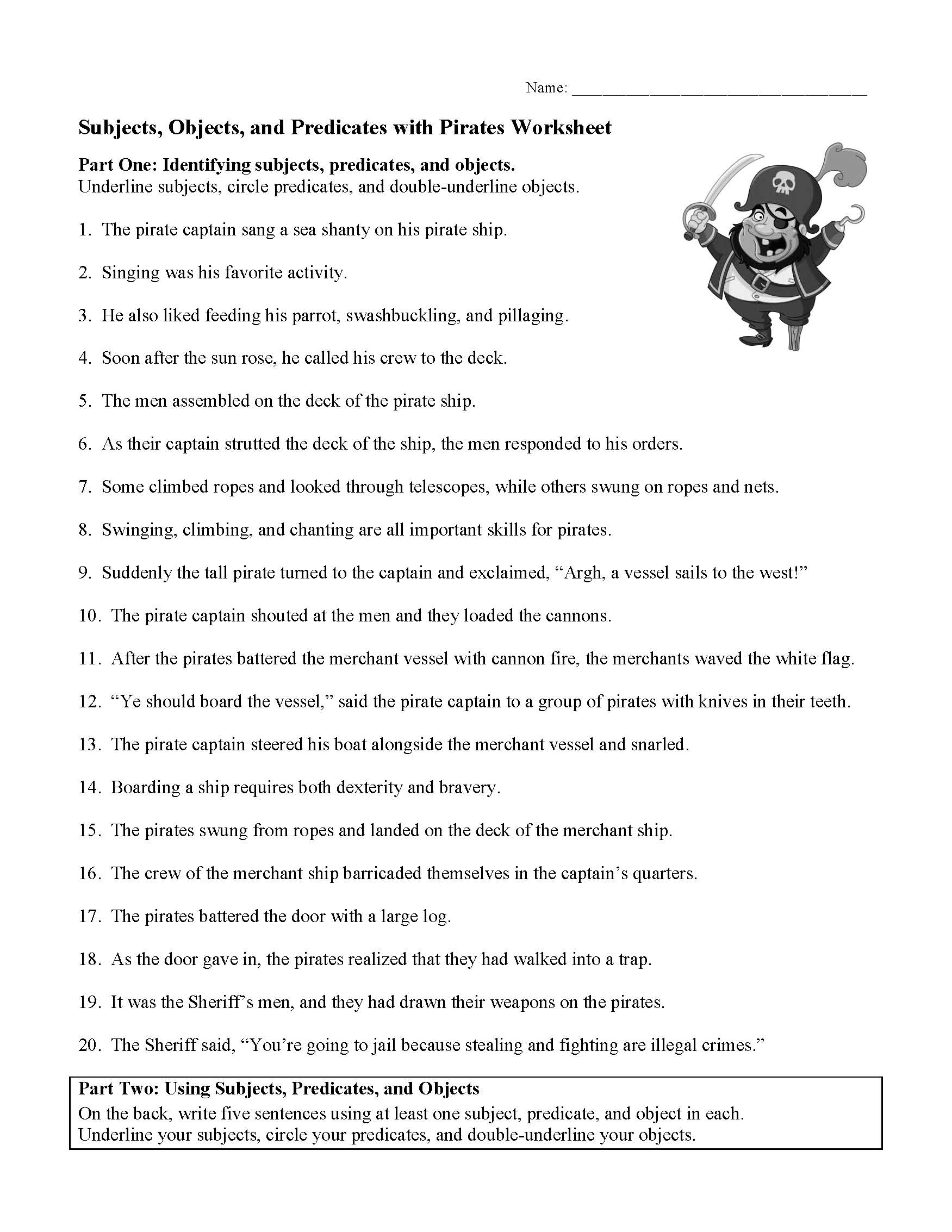
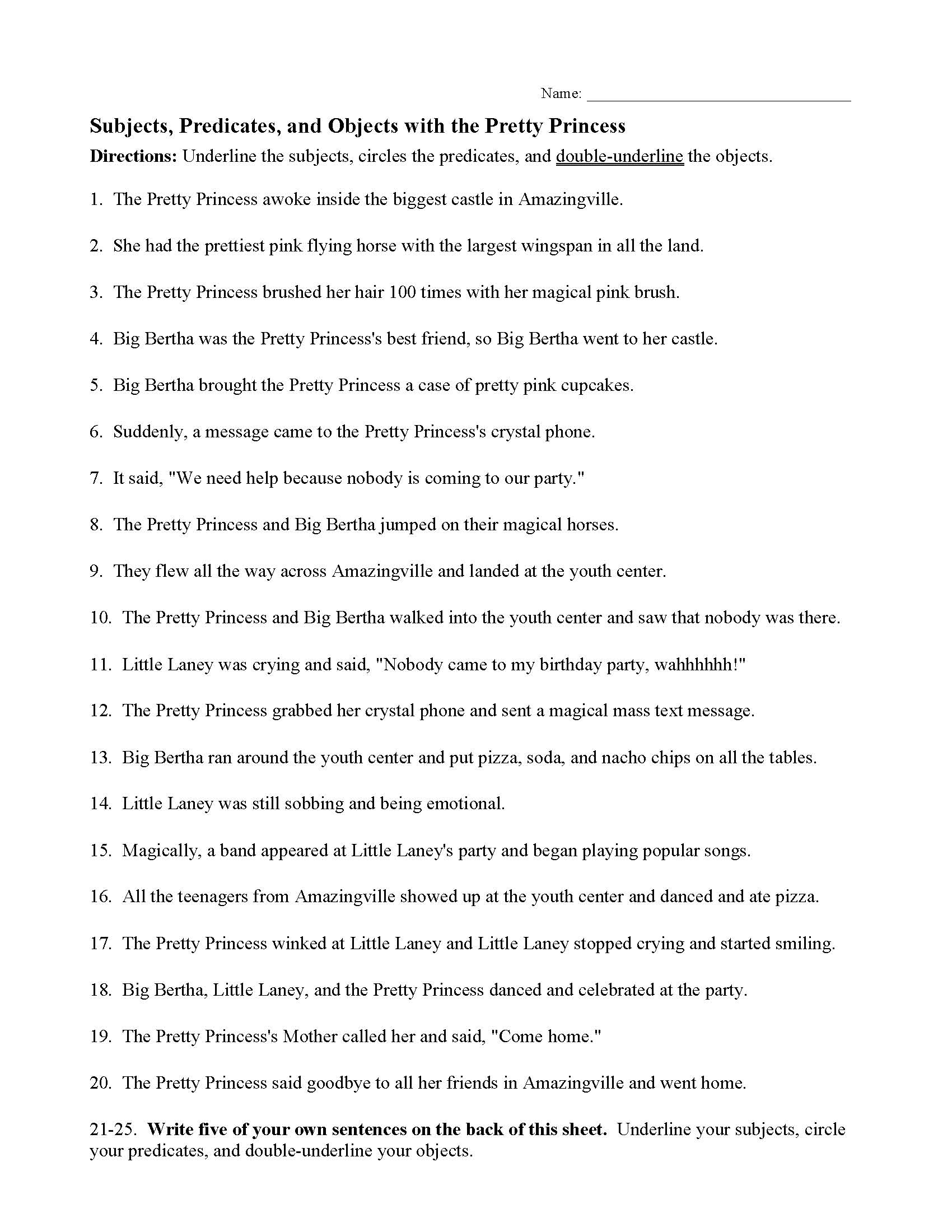
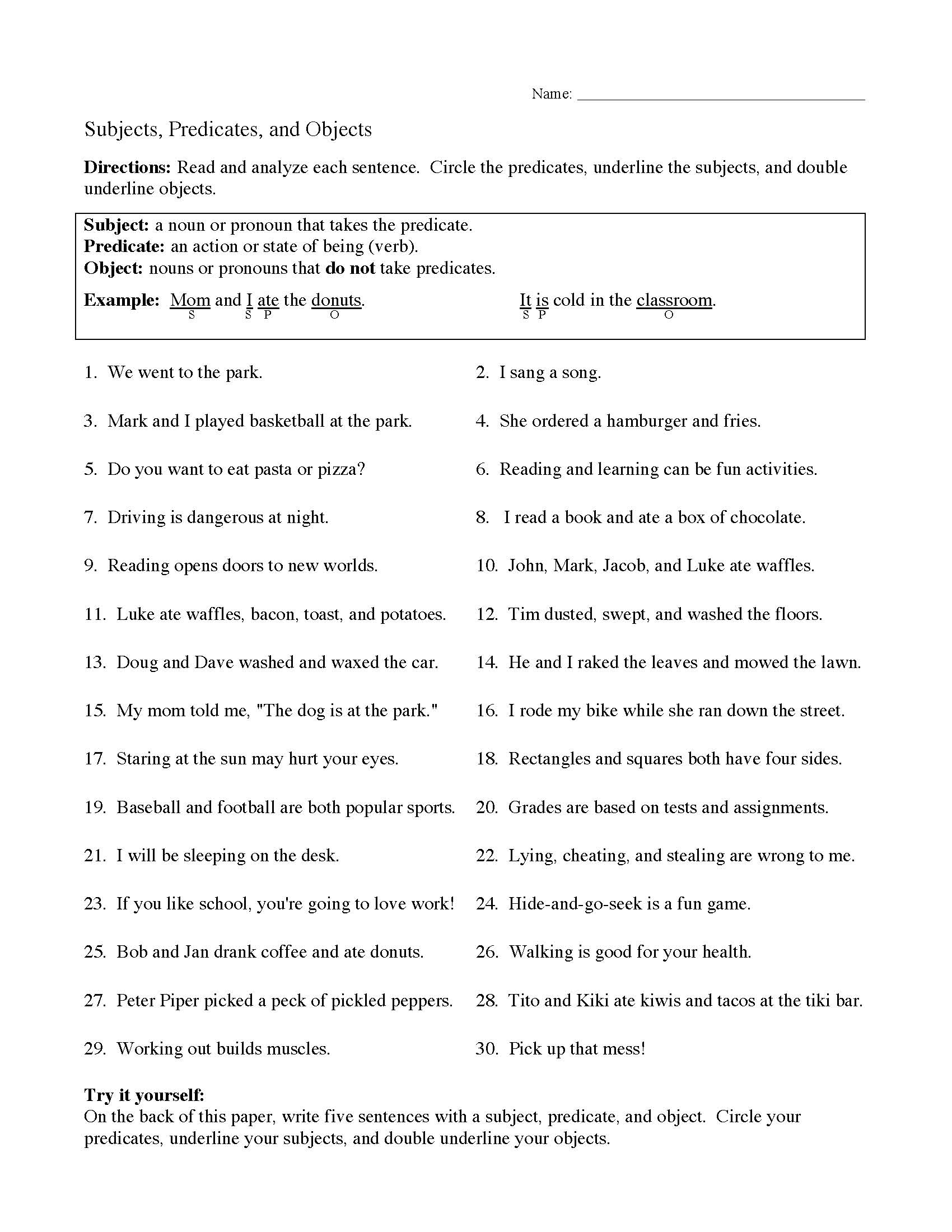
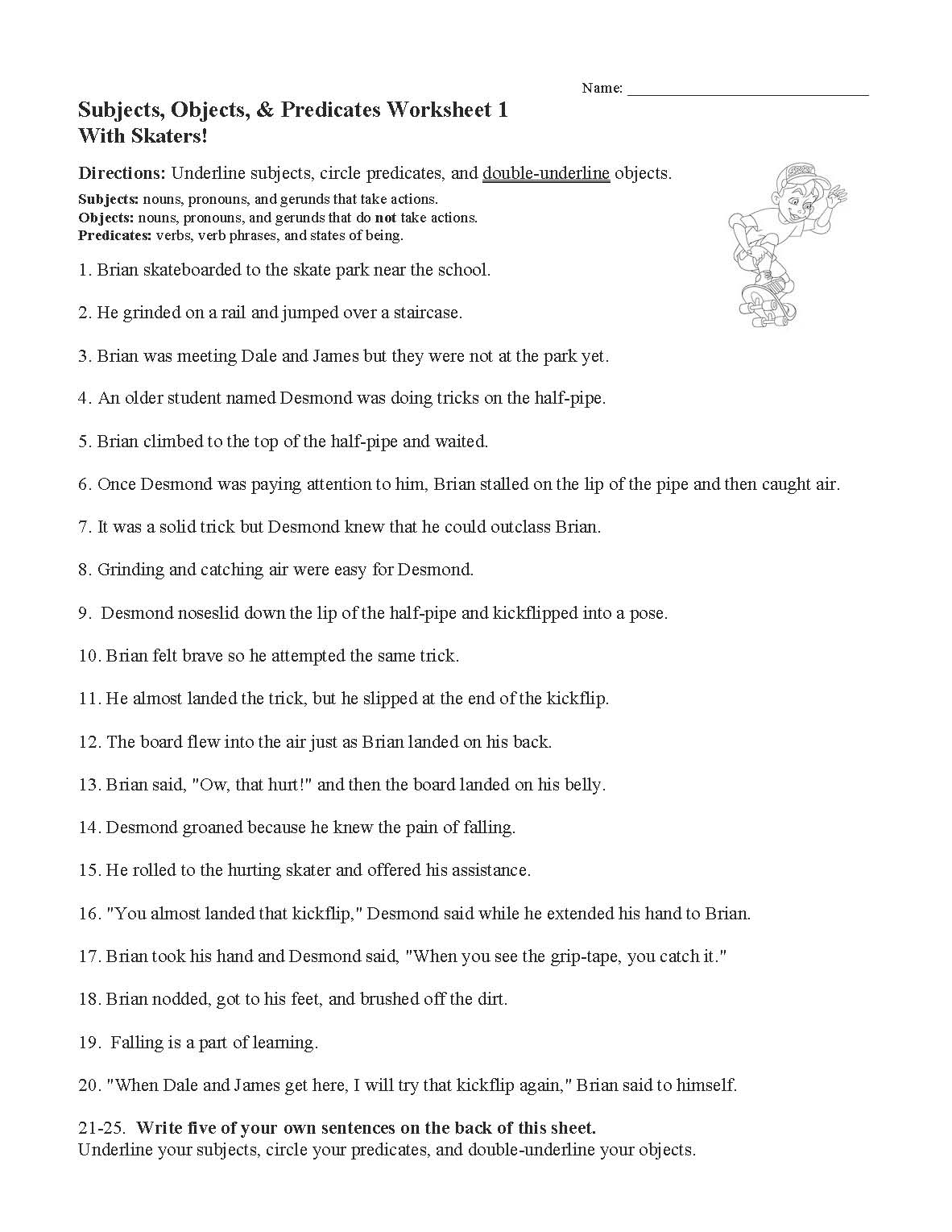
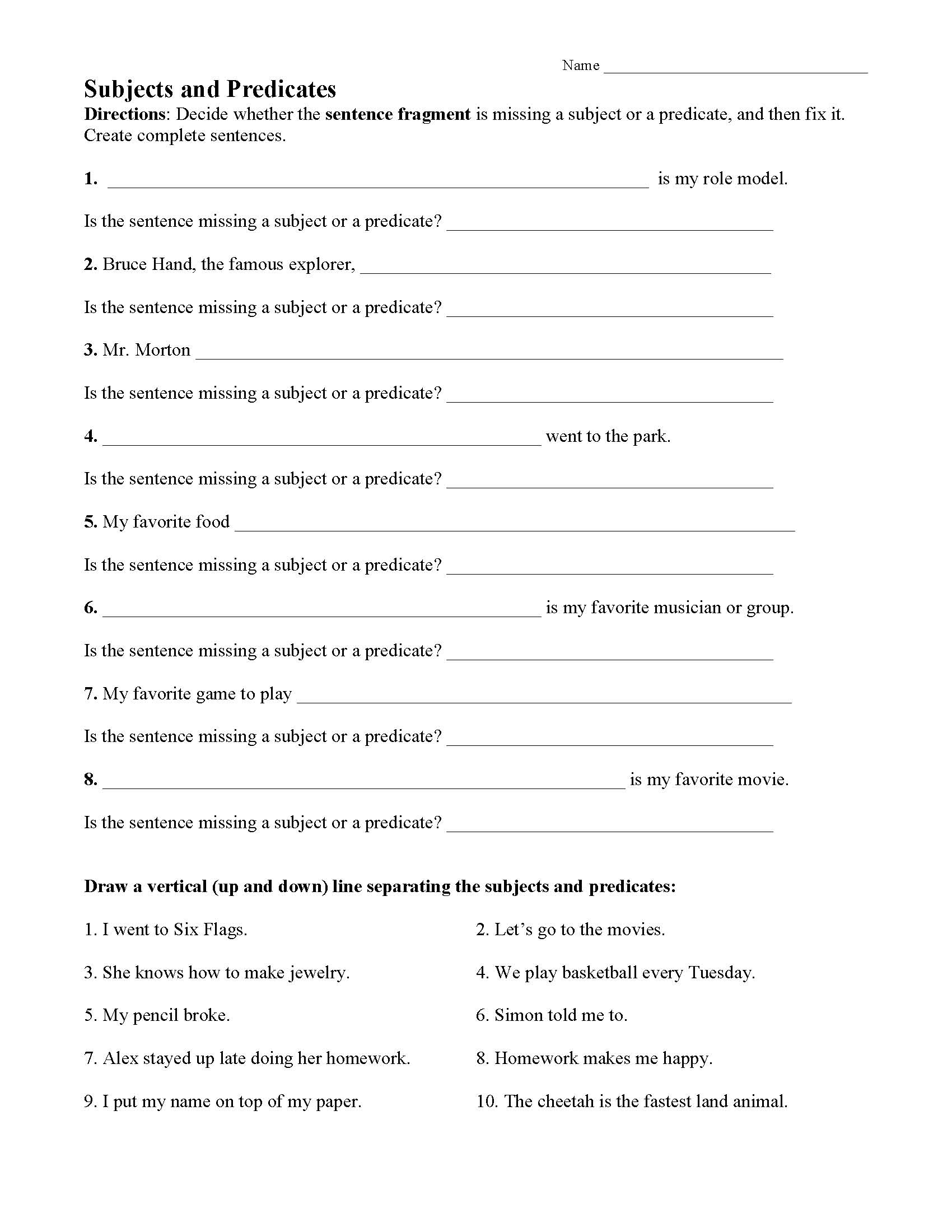
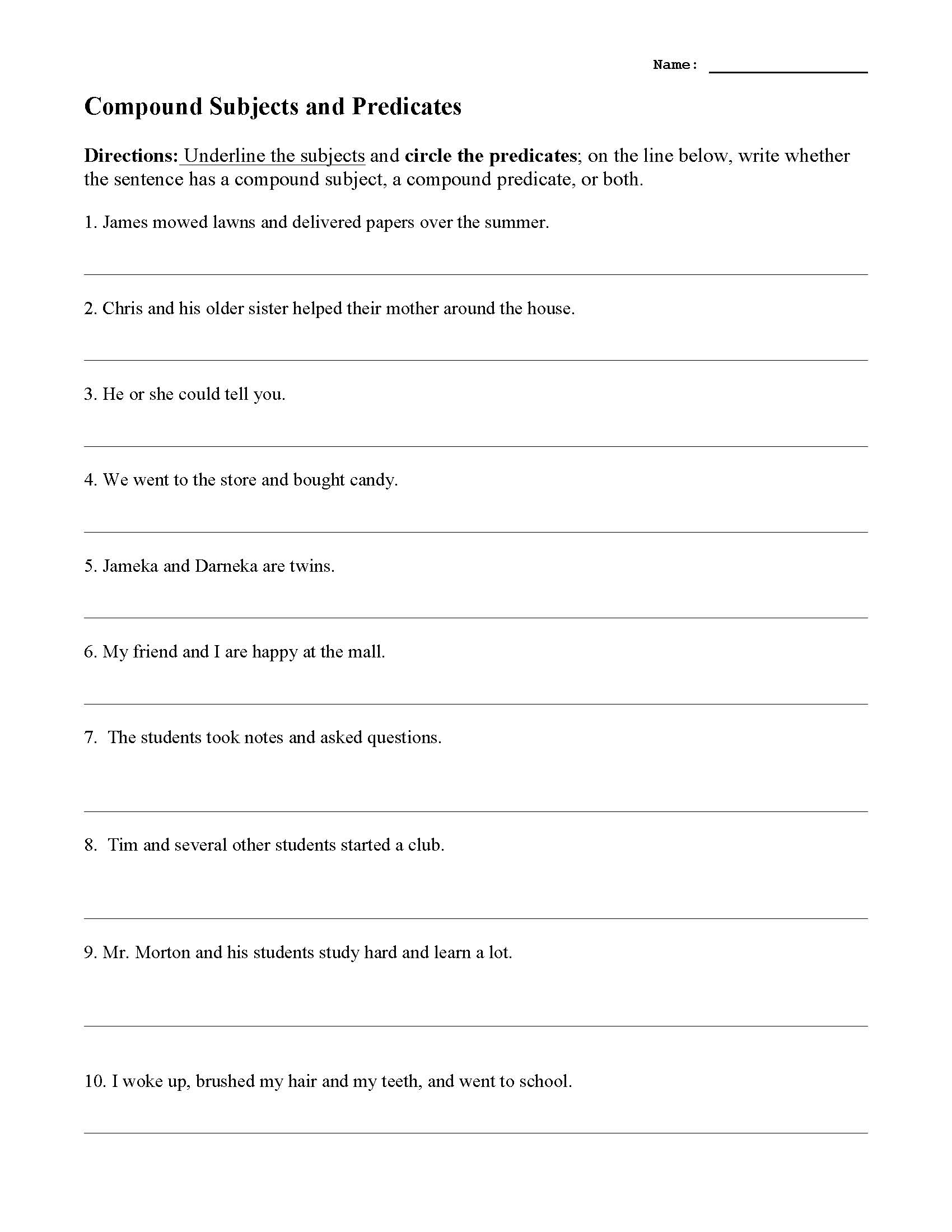

Search here.
36 Comments
Leave a Reply
- Author's Purpose Worksheets
- Characterization Worksheets
- Conflict Worksheets
- Fact and Opinion Worksheets
- Figurative Language Activities
- Figurative Language Poems with Questions
- Genre Activities
- Irony Worksheets
- Making Predictions
- Mood Worksheets
- Nonfiction Passages and Functional Texts
- Parts of Speech Worksheets
- Poetic Devices
- Point of View Worksheets
- School Project Ideas
- Setting Worksheets
- Simile and Metaphor Worksheets
- Story Structure Worksheets
- Text Structure Worksheets
- Theme Worksheets
- Tone Worksheets
- ALL PAGES AND WORKSHEETS




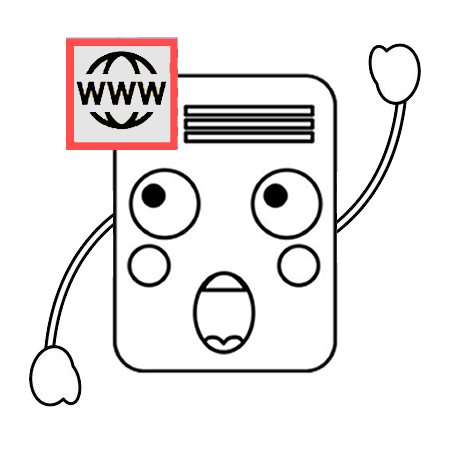



Sam
/ August 16, 2023Dear Mr. Morton,
Thank you for this. I have two sentences that are perplexing me.
Can you please help me? What’s the subject in the following sentences
1.On the chair lay his sweater.
2. My cousin’s favourite game is hockey.
Regards
Sam
Mr. Morton
/ October 26, 20231. sweater
2. game
Best wishes!
Cyyyy
/ July 11, 2022so whats the subject of (It was late when we got home.) ? IT or WE ?
Mr. Morton
/ July 11, 2022That is a complex sentence with two clauses. In the first clause the subject is IT. In the second clause the subject is WE. The clauses are joined with the conjunction WHEN.
vitoria
/ September 19, 2020thank you so much this is helpful
choco
/ July 12, 2020could you please attach a do it yourself worksheet
Evangeline Green
/ March 23, 2020do we have to do every sheet?
Mr. Morton
/ December 9, 2021Yes. Twice.
Vaunn
/ April 23, 2019In “Objects” example, the object is chicken and not pizza
Mr. Morton
/ December 9, 2021Thanks!
I fixed it.
Haha
/ April 1, 2018This is a good website. I was very confused but now I got it…
GOOD JOB
Sha
/ February 2, 2018Great website
Thank you so much
Peyton
/ May 15, 2017Thank you for making this website. It helped me a lot.
Drake
/ October 9, 2016NOT GOOD! GO IMPROVE! MY SCHOOL TEACHER EXPLAINS IN A MUCH EASIER LANGUAGE!
I was joking!
Its really really really really really really really nice!
Lily
/ April 5, 2016Great worksheets
kiran
/ July 6, 2015nice one
kiran
/ July 6, 2015very easy to understand expecially the video.
Rukhshan Meer
/ June 2, 2015Preparing for my exam from your worksheets 🙂
Laura
/ October 21, 2014Thaks for making his site and it helped alot. Are there worksheets tht we can do ourselves?
Mr. Morton
/ October 23, 2014What do you mean?
maha
/ January 9, 2014Its so easy to understand from this website.. Thankyou 🙂
Sean
/ January 9, 2014I believe it should read, Pretty Princess’ adventures in Amazingville or the Pretty Princesses and their adventures in Amazingville. Possessive, not plural.
“[…] sentences about the Pretty Princesses adventures in Amazingville”
Mr. Morton
/ January 9, 2014Fixed, thanks.
Mr. Haleem
/ December 11, 2013Thanks for your helpful sheets 🙂
T.Arora
/ August 18, 2013Thank you for this wonderful website. I appreciate the time you have put into the lessons and the website. It is easy to understand from it. It’s been very helpful. 😀
Shabeer Ahmed
/ November 20, 2012i find it very helpful for english. i am very glad that many teachers like you working and trying there best so that the students learn easily.
Thank you.
Mr. Morton
/ December 2, 2012Thank you for your appreciation.
Adriana Martinez
/ November 8, 2012Thank you, this is so easy to understand. Makes it so much easier to explain to my daughter. thank you, thank you!
Sonia Clarson
/ October 19, 2012Thank you for this wonderful website. I have been teaching high school English for many years, but this is my first year teaching middle school reading classes. Your website has been an excellent resource. I appreciate the time you have put into the lessons and the website. Thank you!!!
CMR
/ September 25, 2012Your resources seem to be tailor-made for the middle school ELA class. I appreciate the time and effort you put into making quality teaching and learning tools. THANK YOU!
sheila marie gonzales
/ June 30, 2012do you have answer key for each worksheets?
Mr. Morton
/ August 10, 2012Yes, answer keys have been added. Click “View Answers” underneath assignments where it is applicable.
Augustine
/ April 29, 2012I wanted to tell you one of the best things about your web site is the way it is so easy to understand. You give options and then give answers. I booked marked the site for myself and plan to share it with another hosp. teacher I know.
When you spend alot of time perusing the web trying to match curriculum with special needs and illnesses, it is so nice that it is so easy to stop here.
Mr. Morton
/ May 3, 2012Thank you kindly! I’m glad the site is helping.
Andrea
/ January 29, 2012Thank you for the great worksheets.
Mr. Morton
/ January 31, 2012I’m glad that you’ve found them useful. I keep intending to improve the “Language Arts” section of this website, and I keep getting side tracked, but thanks for appreciating what I have.